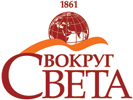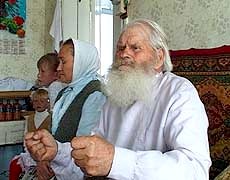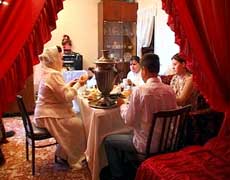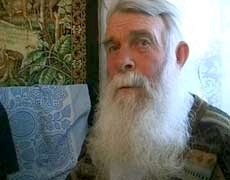Vokrug Sveta (Around the World)

Click here to see show webpage for: Armenia, Molokans
Translation of show text:
The sect of Molokans was founded in the 2nd half of the 18th century in Tambov province. The nickname of "Molokans" stuck to the sect probably because they consume milk. Molokans call themselves "true spiritual Christians". In the 19th century Molokans wanted to avoid persecution, they began to move to the edges of the empire, including Transcaucasia. They live there now keeping their traditions and the faith of their ancestors. [This newscast is mostly about Dukh-i-zhizniki, not Molokane. ]
Click to see segment webpage for: Armenia, Molokans
Also posted at www.Worlds.ru
Summary of segment text: (Complete translation later. These images are from the original broadcast posted, which since has been modified and the website now only shows one scene of Ivan Zadorkin, below.)
We met Dukh-i-zhizniki
The first Russian villages in Transcaucasia began in the beginning of the 19th century, mostly from different sects. But the most well-known are the Molokans. The Orthodox called them "molokane" because they drank milk during fasts, particularly Lent.
 In
1842 mostly Pryguny and some
Molokane
In
1842 mostly Pryguny and some
Molokane This is what a British traveler wrote who visited Armenia in the 19th century: "Their limbs are poorly connected in their joints. These Russians are a major contrast with the Armenians. Their faces are not symmetrical, with small eyes, and void of vivid facial expression. The women wear head scarfs and clean dresses." Spiritual Christians
 There
are only two streets in the village — Sentralnaia (central)
and
Pogrebal'naia (for burials) which leads to the
cemetery. [It is an
Eastern-European row-village
similar to the layout of the Prygun Guadalupe
village
in Mexico.] The first houses were built
communally, and
animals
and land were all communal. Today they are hard working,
sober, honest
and
help each other. Spiritual Christians
There
are only two streets in the village — Sentralnaia (central)
and
Pogrebal'naia (for burials) which leads to the
cemetery. [It is an
Eastern-European row-village
similar to the layout of the Prygun Guadalupe
village
in Mexico.] The first houses were built
communally, and
animals
and land were all communal. Today they are hard working,
sober, honest
and
help each other. Spiritual Christians
Before the revolution there were 12 Spiritual Christians

 Prophet Ivan
Vasilich Zadorkin [left] and
wife with grand-kids. Their daughter
Galina Ivanovna Iurtaieva, also a prophetess, lives in a
small one-room apartment
in Erevan with 5 kids [right]. Galina works as a nanny
for an
Armenian
family that wants their kids to learn Russian. [After
perestroika, the official language reverted to Armenian.]
The
elder Zadorkin had a a prophesy that two mountains will
protect Fioletovo
from
the apocolypse. [This may explain why
Fioletovo
is
is the last village in Armenia inhabited nearly entirely
by 3 divided congregations of Dukh-i-zhizniki and
one congregation of Molokane. Nearby Lermontovo is
about half Russian.]
Prophet Ivan
Vasilich Zadorkin [left] and
wife with grand-kids. Their daughter
Galina Ivanovna Iurtaieva, also a prophetess, lives in a
small one-room apartment
in Erevan with 5 kids [right]. Galina works as a nanny
for an
Armenian
family that wants their kids to learn Russian. [After
perestroika, the official language reverted to Armenian.]
The
elder Zadorkin had a a prophesy that two mountains will
protect Fioletovo
from
the apocolypse. [This may explain why
Fioletovo
is
is the last village in Armenia inhabited nearly entirely
by 3 divided congregations of Dukh-i-zhizniki and
one congregation of Molokane. Nearby Lermontovo is
about half Russian.] The elder Aleksei Nikolaevich Novikov
[right] lives with
his wife Nadezhda
Vasilevna. They sometimes visit their kids who moved to
Stavropol' to
work
and send aide back home.
The elder Aleksei Nikolaevich Novikov
[right] lives with
his wife Nadezhda
Vasilevna. They sometimes visit their kids who moved to
Stavropol' to
work
and send aide back home.In 2005 the Molokans are preparing to celebrate the 200th anniversary of the Tsar's manifest for religious freedom, while most of the Dukh-i-zhizniki did not.